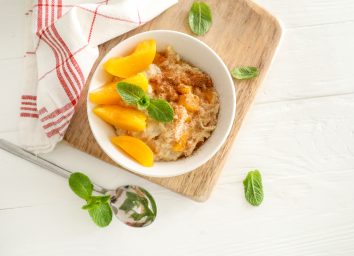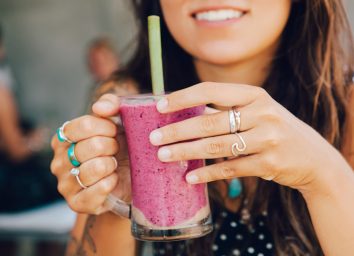Best Breakfast Habits for a Healthy Gut, Say Dietitians
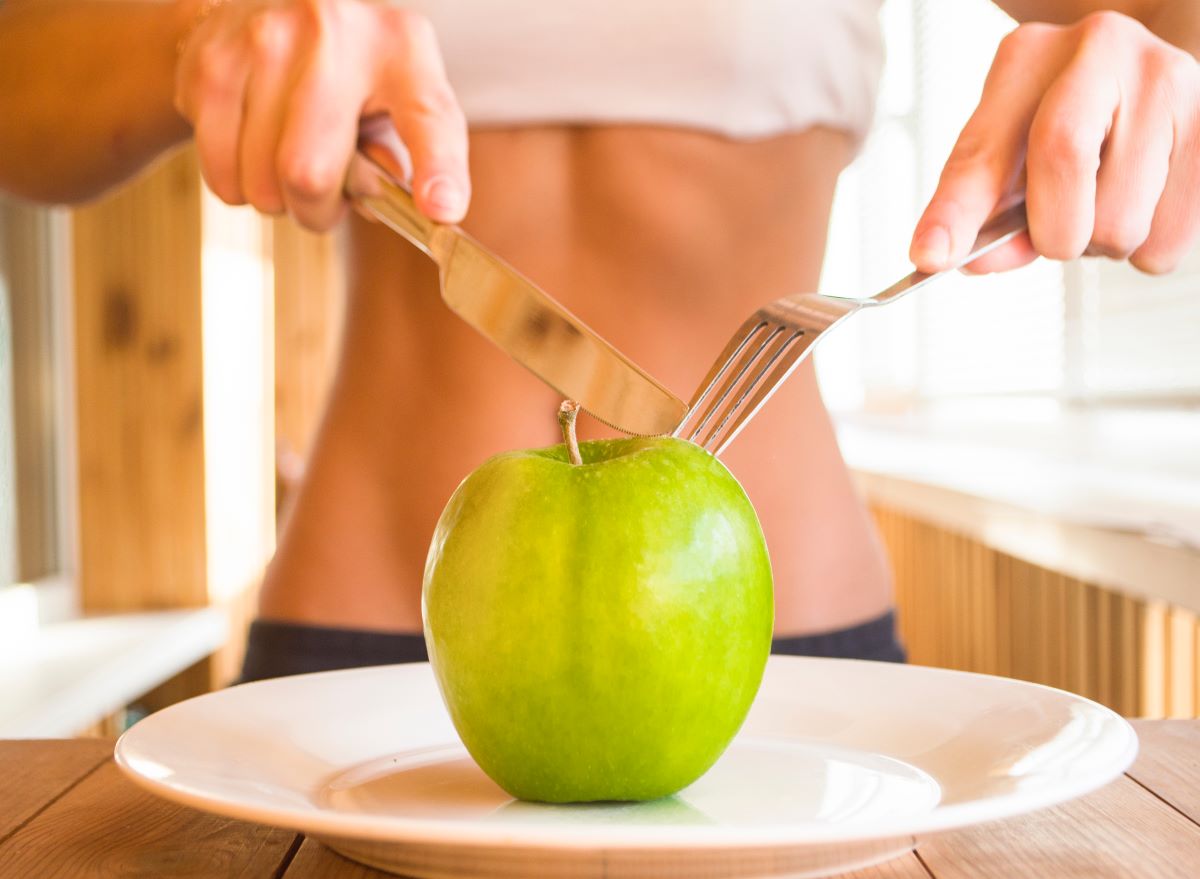
An unhealthy gut means that your digestive system is unable to process food properly, which could lead to digestive issues such as gas, bloating, and abdominal pain. Your immune system can also become weak due to a lack of bacteria in the gut, potentially causing chronic pain, fatigue, diarrhea, or constipation.
There are, however, ways to revive your gut. A healthy gut can easily be affected by what you drink and eat, so it's important to eat healthy foods and maintain a routine.
Eating breakfast comes with a lot of beneficial effects for your body, such as helping your immunity and shrinking belly fat. Getting into positive breakfast habits can also be important for maintaining a healthy gut. If you're looking to work on a better gut, we've got a few tips from members of our medical board expert on the best breakfast habits to follow. Then, for more information on healthy guts, be sure to check out The Best Breakfast Foods for a Healthy Gut, Say Dietitians.
Fill up on fiber.
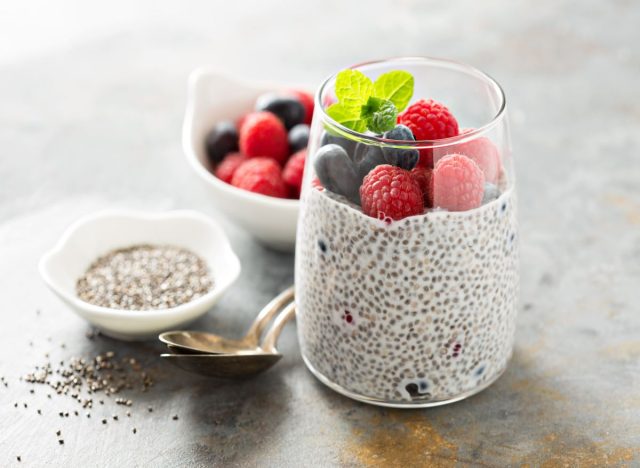
"Not only does fiber help keep you full, stabilize blood sugar levels, and lower cholesterol, but it can also promote a healthier gut," says Lisa Moskovitz, RD, CEO of NY Nutrition Group, author of The Core 3 Healthy Eating Plan.
Moskovitz suggests aiming for at least 25 grams of fiber per day and around 5 to 10 grams at breakfast.
"Breakfast is an opportune time to load up on fiber-filled foods such as bran cereals, chia pudding, overnight oats, or a berry smoothie," says Moskovitz.
Brittany Dunn, MS, RDN, CD, suggests that eating oatmeal for breakfast is ideal because they contain fiber, also known as beta-glucans. Not only does that contribute to creating a healthy gut microbiome, but is also associated with managing blood sugar levels and lowering cholesterol.
"The best part is that oats are really versatile," says Amy Goodson, MS, RD, CSSD, LD, author of The Sports Nutrition Playbook. "They can be eaten as oatmeal, chilled overnight oats, toasted and used as a topping on yogurt parfait or you can grind oats into flour for bread, pancakes, and muffins to amp up the fiber of your favorite baked breakfast foods. And better yet, oats pair well with other foods that help your gut health like berries, nuts, and seeds."
Prioritize probiotics.
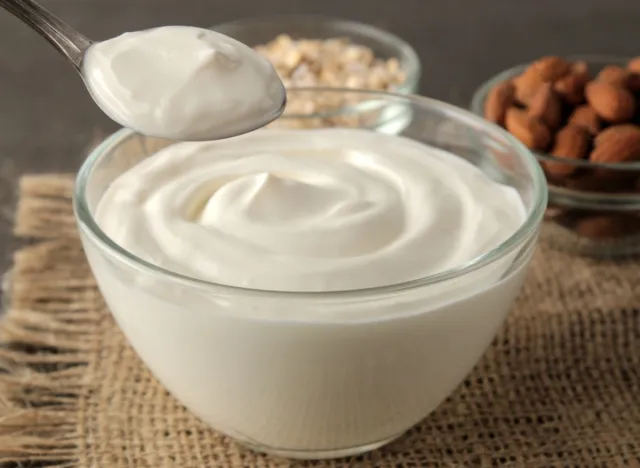
Probiotics are good bacteria that are important for a healthy gut and digestive tract.
"The more good bacteria in your gut, the better it functions and properly digests and absorbs the food you eat," says Moskovitz. "Further, a healthy gut can lead to a stronger immune system, more effective metabolism, and may even benefit mental health."
"Some probiotics like Bifidobacteria and Lactobacillus may even help lessen symptoms of Irritable Bowel Syndrome and decrease some of the negative gastrointestinal issues that people have like bloating, cramping and diarrhea," says Goodson.
A common probiotic you eat in the morning is yogurt, which is very versatile. It can be eaten as a yogurt parfait, mixed with other gut-friendly foods like berries, whole grain cereal and nuts. Yogurt can also be blended into a smoothie or used as a topping for whole grain waffles or pancakes.
"It helps start the day off with a good balance of both carbohydrates and protein," says Dunn.
Another less common, yet just as healthy probiotic to eat with your breakfast is kefir. According to Dunn, kefir contains 15 to 30 different strains of bacteria plus yeasts, making it a great option to support gut health. It's also much lower in lactose than milk, making it a great option for those who may experience issues with lactose.
Vary it up with veggies.
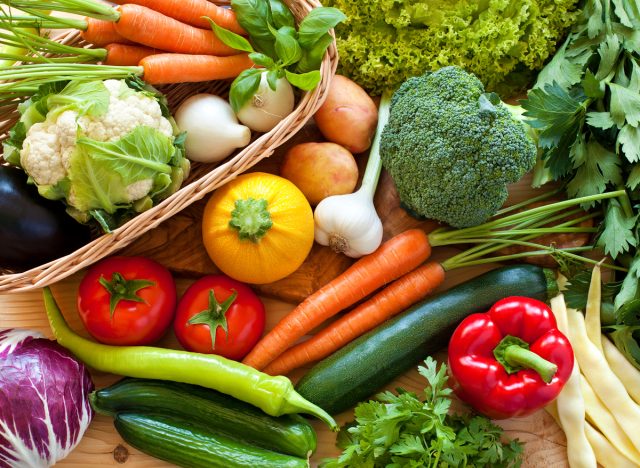
Vegetables consist of tons of nutrients such as potassium, magnesium, and fiber that make it a great source of food throughout anytime of the day, breakfast included.
"Spinach might not be the first food on your mind when you get out of bed, but starting the day off with a serving or two of vegetables can truly set a gut healthy tone for the rest of the day," says Moskovitz.
Vegetables also contain polyphenols—compounds that improve digestion, brain function, and blood sugar levels, as well as protect against blood clots, heart disease, and certain cancers.
"Polyphenols have antioxidant activity which can fight against oxidative stress, which harms our body from the inside out," says Moskovitz. "Not only do they modulate inflammation, but antioxidants can also act as prebiotics which feed our good bacteria so they can flourish and thrive."
Some easy ways to get in more vegetables include adding fresh spinach or zucchini to protein smoothies, topping your eggs with sliced tomato and onions, adding sprouts or thinly sliced radishes to avocado toast, or doing a savory oatmeal by adding in beans, mushrooms and cauliflower rice.
Dunn also suggests that asparagus is a great breakfast vegetable to help start your morning.
"While not a super traditional breakfast food, asparagus contains prebiotics—foods to feed the bacteria or probiotics," says Dunn. "There are plenty of strains of bacteria that we cannot get from probiotics that prebiotics provide."
You can add asparagus to omelets, scrambles, breakfast sandwiches, potato hashes, quiche, even as a standalone side dish.
Eat more fruits.
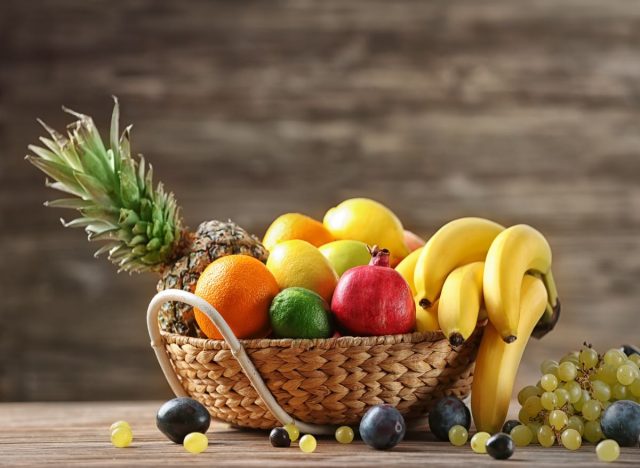
Generally speaking, most fruits are naturally low in fat, sodium, and calories, and are sources of many essential nutrients including potassium, dietary fiber, vitamin C, and folate, which are vital for health and maintenance of your body. According to the U.S Department of Agriculture's MyPlate, eating more fruits as part of an overall healthy diet are likely to have a reduced risk of some chronic diseases.
Dunn suggests certain fruits such as apples, pears, and bananas, make for great breakfast options to get your day going.
Apples contain polyphenols-antioxidant and antiinflammatory properties. The polyphenols have prebiotic characteristics and apply antimicrobial effects against pathogenic gut microflora—meaning they protect your body from harmful bacterial species that promote their own growth and can spread disease throughout the body. They also contain fiber to contribute to lowering cholesterol.
"Pears contain prebiotic fiber that helps improve gut health by providing food for good probiotic bacteria," says Dunn. "Bananas contain prebiotics and resistant starch. Resistant starch is resistant to digestion, and bacteria can feed on it as it passes through the large intestines."
Dunn also states that bananas contain pectin, which can feed gut bacteria and help feel fuller for longer through to the next meal.
Here's why Probiotics and Prebiotics Aren't the Same Thing.

